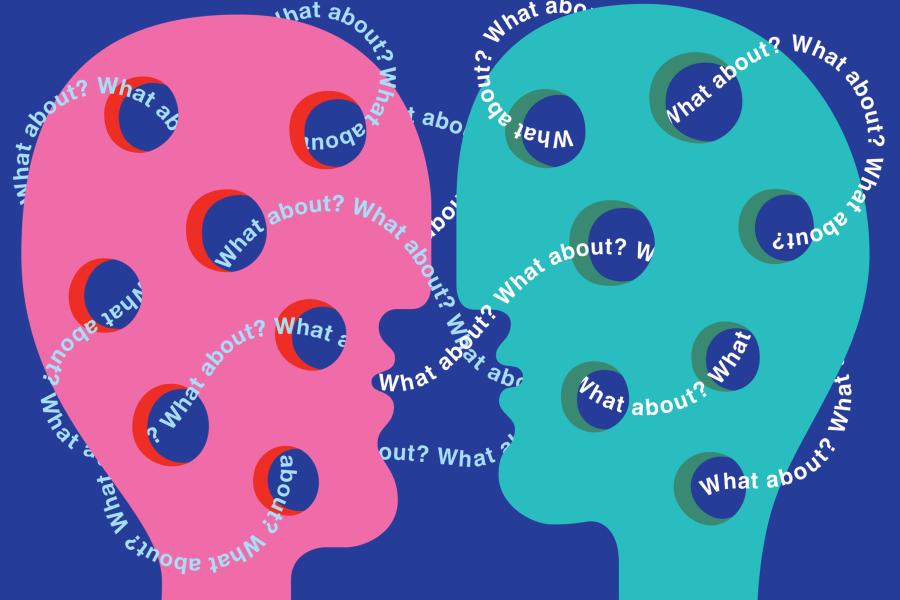In early 2020, just before the onset of the pandemic, a cognitive scientist, a philosopher, and a few economists began meeting to read research papers together. The subject matter was communication, and it soon became clear that they had very different perspectives on what it meant.
For philosophers, it's generally seen as a cooperative interaction through which conversational partners share information transparently. To economists, however, communication is meant to be strategic, often resulting in information being withheld to give one party an advantage.
Before long, though, the professors saw their dissimilar views as an asset. The consensus was that by working together, they could more effectively tackle a timely but complex subject—deceptive and bad-faith communication.
"We want to get a better understanding of when certain types of manipulative communication can work and why they can work," says Associate Professor Kyle Rawlins, a cognitive scientist. "Then [we can] start to get at questions like how we can defuse these techniques."
Rawlins is part of a team of Johns Hopkins scientists that received a 2022 Johns Hopkins Discovery Award. The other researchers include Justin Bledin, an associate professor of philosophy; Chen Cheng, an assistant professor of economics in Carey Business School; Ying Chen, an associate professor of economics; and M. Ali Khan, a professor of political economy.
"One of the hopes is that out of this collaboration will come something that actually can have an impact in both fields instead of being siloed," Rawlins says. He sees the opportunity to use what they learn from Chen to build models that will help them better understand how people in a large network choose whom to believe.
Take, for example, the decline in the public's confidence in experts and public figures after COVID-19, Chen says. She's studying social networks and the varying weight given to opinions based on a person's popularity. She noted that social media has made "grassroots opinions"—the attitudes of people not ordinarily in the public eye—more accessible. One of her goals is to provide a clearer picture of the extent to which decreasing respect for authority can slow the rate at which a society reaches consensus on an issue. For instance: With growing distrust of doctors and the increasing reach of social media influencers, will it take us years to agree on vaccine safety or will it be more immediate?
For their part, Rawlins and Bledin are focusing on manipulative communication techniques that have become increasingly common in public discourse—phenomena like whataboutism and dog whistles. The former is the practice of responding to an accusation by making a counteraccusation or raising a different issue to distract the audience. The latter involves the use of coded or suggestive language to send a message to a subset of an audience, such as speakers who made a point of mentioning Barack Obama's middle name, Hussein.
"Whataboutism is a very interesting way in which we use language to manipulate our audience for our own interest," Bledin says. "It's trading on our desire to be cooperative with one another and taking seriously the questions asked by our interlocutors. But it's really about taking attention away from one question—usually one the speaker would prefer not to answer—and shifting it to another."
The research on dog whistles will explore when they are an effective strategy and how their negative effects can be reduced. A key part of the analysis of whataboutism and dog whistles will be determining how game theory can best be applied—in other words, analyzing different kinds of conversations as strategic games.
"Game theory provides a really rigorous framework for thinking about what someone should do when they're communicating, whether they're being cooperative or not," Rawlins says. "It especially applies to understanding what someone does when they're trying to be manipulative."
That's where the collaboration with economists comes into play. Game theory, an analysis of interactive decision-making where the outcome for each "player" depends on the actions of all, is used most frequently in business and economics studies. It's one way Rawlins expects he and Bledin will benefit from working with Chen and Ying, both game theory experts.
"I think there are two perspectives you can take on many of the questions we're asking," Rawlins says. "Take dog whistles. You can use a model of three people. There's the one using the dog whistle, the one who knows the meaning, and the one who doesn't. That's on a very micro scale.
Also see
"But what happens when these communication techniques are used in a large network of people who may have many different goals and many different beliefs?"
One thing is clear: The landscape of communication sure has changed.
"Look at the ways people are talking to each other," Bledin says. "You know, sending off a tweet into this vast space of listeners just to get likes, not even necessarily to convey reliable information. Many of the standard ways in which we think about discourse don't really apply anymore."
Posted in Politics+Society








